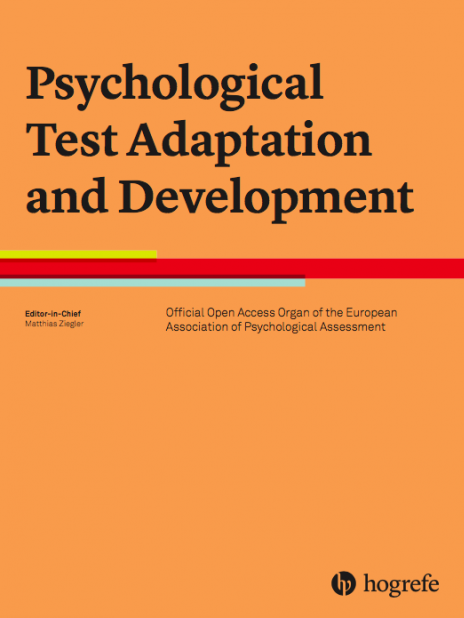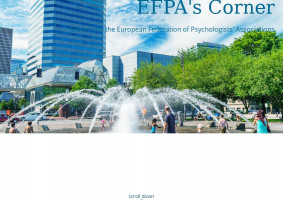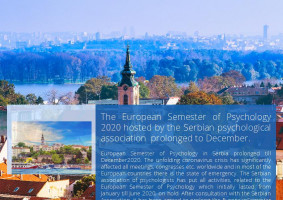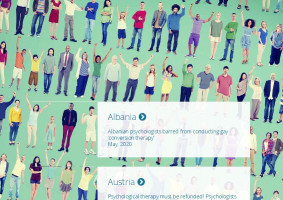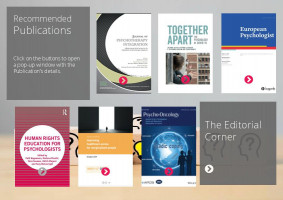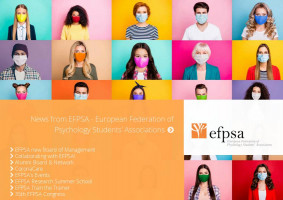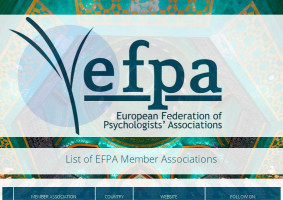_w484_h294_1.jpg)
Jump to:
COVID-19

Jump to:
Stop Racism
_w474_h284_1.png)
Jump to:
Hogrefe
(1)_w302_h350_1.jpg)
-
EFPA during Covid-19
By Nicola Gale, EFPA’s Vice President
The Covid-19 pandemic has had wide ranging health, economic and personalconsequences for us all, and some have suffered bereavement and loss, andeconomic hardships. We know that many of you reading this magazine now, and those people you serve, will have been heavily impacted by Covid-19. At EFPA, our hearts go out to all who have and are still suffering. Click on text to fold out
Click again to fold in again
We have worked hard to do our bit to help during this pandemic. My role as one of EFPA’s Vice Presidents, along with EFPA’s Communications Officer Ruth Mozagba, has been to coordinate our response. One of the first things we did was develop our EFPA Psychologists’ Support Hub about the COVID-19 crisis. The information in the Hub is the result of teamwork from our colleagues from all EFPA groups, member associations, and partner organisations.
The Support Hub gives a single point of access to psychology resources for psychologists to use. The resources cover supporting individuals, families across the age span, local and national communities, and support for psychologists in their own professional practice. They are mainly in the language of the country concerned. Links to the World Health Organisation (WHO), European Centre for Disease Prevention and Control (ECDC) and country government guidance are also given.I have participated regularly in the global psychology leadership team Covid- 19 group which meets regularly hosted by the American Psychological Association’s Senior Director for International Affairs Amanda Clinton, who has done so much to bring global psychology organisations together. This has greatly benefited speed of information sharing and quality of support for psychologists on the ground. Together with EFPA expert Lotte De Schrijver we participated in the group which developed the policy and tip sheet against home based violence which was launched across over 60 countries worldwide.
Covid-19 has required major adjustment in how EFPA operates and how we all work together. This has been challenging for many of us, especially those of us newer to EFPA and just getting to know our groups and countries. In some ways though, Zoom has brought us closer more quickly, and I for one have had many a meeting now with my (Spanish) dog snoozing under my desk. I’ve been fortunate at a personal level in that the UK government allowed access to allotment gardens even during lockdown as long as certain rules were obeyed, so I have been able to continue to plant and tend my vegetables and flowers in the small county village in which I live, and get plenty of fresh air.
I thought it would be interesting to know how my colleagues on EFPA’s EC and in Head Office have coped with lockdown from various points of view, and for our readers to get to know them a bit better, so below is a snapshot of what they told me.
(1)_w302_h290_1.jpg)
-
Christoph Steinebach, EFPA’s President, works in higher education management. He has found that this work and association work during the pandemic are different but effective in their own way.
He told me: “At first, getting into 100% home office and online work was certainly an absolute challenge for all of us. My school is also the largest psychological service provider in Switzerland with offers in all application fields of psychology. All of the two hundred staff members have shown great commitment and have certainly achieved more than they should have. Now we must consider which of these changes we want to secure in the long term.”His focus for EFPA has been on strategy, and ensuing continued momentum for delivery. “For EFPA, the strategy was well defined before Corona: Together, we wanted to strengthen our external presence, make information more easily accessible both internally and externally, develop cooperation between our associations and with external associations, make internal processes faster and more effective, and make an important contribution to improving the quality and diversity of psychological services. Because of the lockdown, we had to work differently but still pursue our strategy. And today we are much better positioned in all strategic points than we were six months ago. Never before have our meetings been so well attended, never before has there been so much support for our activities! We are better networked internally and also very well positioned externally. Psychology is in demand and psychology helps! Completely in the sense of our strategy.”
Christoph is sure that he makes more appointments now, because there is no more travel time. It is still hard work for him however: “After a series of video meetings I am really exhausted. But at home I can arrange breaks differently and live healthier. One more thing I would like to secure for the long term.” Living by Lake Constance on the Swiss German border Christoph is well tuned into the importance of nature and work life balance as he sits in his study at the window, surrounded by his books.
_w302_h318_1.jpg)
-
Ole Tunold, EFPA’s other Vice President, has been focused on leading his own psychology association, the Norsk psykologforening (Norway) whose secretariat numbers 50 employees. He has had his office to himself as all his staff worked from home. He has been focused on member service, political influencing, and ensuring the systems and processes work well.
Ole said: “Our operations lean heavily on meetings, be it training for groups of 20-30 people, conferences of around 100 participants and congresses of upwards of 400 attendees. Meetings with politicians and government representatives account for other face-to-face arenas. By a stroke of luck, we already had in place not only the tools for digital meetings, but also a certain level of training when the pandemic hit us.
“Our association has chosen to concentrate its efforts on:- Supporting our members (students, private and public practitioners, and members in specialisation)
- Assisting the authorities (Directorate of Health, Ministry of Health, Parliament), proactively and reactively
- Advising the public (children at risk, isolation, digital therapy, etc.)
The overall opinion of our secretariat is that digital meetings certainly have shortcomings, but still work satisfactorily in many settings.”
Asked about the impact on the psychologists who are members of his association, Ole said: “Our members have seen a drop in patient contacts, now slowly returning to normal, as society opens up. The pandemic has spurred exploration of new approaches to digital therapy and provided valuable experience in remote patient contact.” Electronic delivery of services has been the subject of an important EFPA survey generated by our Project Group for e-health, and led by EFPA Convenor Tom Van Daele.

-
Eleni Karayianni, who comes from Cyprus, told me that coming from a small island in the Mediterranean has its perks.
“In the case of facing COVID-19, it meant that it was not so difficult to isolate from other countries as we are already somewhat distant. Luckily, we were one of the countries where the government took firm measures early on and this is evident in the results where things have now returned to “normal” and we have zero or close to zero new cases daily, thus making us one of the safest destinations right now. At the same time, as a culture, we are used to being with each other, spending time with family and friends daily. Social distancing and other restrictions have had their toll, but one thing is certain – relying on family or friends in times of need has been one of the greatest assets, even at times when there may have been weaknesses at systemic level.”Eleni works in higher education and has a key role supporting her students in their training. She has been challenged with switching suddenly to online teaching. “While we pride ourselves with technological advances and knowledge, online teaching is a different ballgame. Especially during a crisis. Even though we shifted quickly to using digital tools, dealing with students’ emotional reactions took significant time away from actual teaching. Some class discussions ended up focusing on how we are keeping up, discussing self-care and support, and how to get through the prolonged uncertainty. On a positive note, students noted the enjoyment of having no travel time to campus, but at the same time the pressure of dealing with the increased workload, time management studying from home, and staying motivated.”
Digital learning and teaching was a topic identified early on as an area for developing understanding of need and subsequent guidance by EFPA’s Board of Educational Affairs led by Convenor Ioulia Papageorgi. Their survey on online/distance teaching of psychology is open until end of July.
A particular challenge for Eleni has been supporting her students in their clinical work remotely. She said: “I had to deal with finding alternative and ethical ways of providing supervision and services, securing continuity and quality of care, coordination between supervisors, training sites and trainees, as well as helping trainees deal with their own reactions to the situation. One thing that helped was having resources handy from various associations via the EFPA COVID Hub, as well as colleagues all over Europe to brainstorm with, share ideas and solutions. This is one of the things that helps with not feeling cut off from the rest of the world when living on an island.”
(1)_w302_h332_1.jpg)
-
Anna Leybina, known to many readers from the hugely successful ECP2019 in Moscow, worked with me and Julie, Ivana, Ruth and Sabine from Head Office in organising EFPA’s two series of webinars.
Anna describes how six webinars dedicated to psychological issues related to COVID-19 conditions were organised. “Experts from Europe and beyond shared their data, opinions and experience in organising helplines, online psychological therapy, mental health systems, digital education, community engagement, and ways to influence responsible citizens behaviors. The webinars were attended by 606 participants 99.9% mentioned that these webinars were useful to them. The webinars have been video recorded and are available in EFPA COVID-19 Resource Hub.”Anna heads a language department at Lomonosov Moscow State University, so was able to access resources quickly to translate some of the webinars into Russian, Spanish, Italian and French.
Anna then went on to talk about working life in Moscow during Covid-19.
“In Russia, organisations (both corporate and governmental) and many psychological departments in schools and universities transferred their activities online relatively fast, considering that some elements and tools were already in place and had been successfully used before the pandemic. Also, there were mutual support on individual and organisational level in online work, services, and education to maintain sufficient results. Many of that was supported with information, digital resources, and expertise of the Russian Psychological Society, which provided assistance to governmental agencies, hospitals, emergency services, and education.”Anna, characteristically as those who know her will recognise, was able to find the some positive consequences of the situation:
- Some essential transformations which were postponed for a long time, had to be implemented, e.g. digital modes of work and information exchange, reduction of unessential and ineffective activities, etc.
- There was a shift in the modes of presentation in both education and corporate environment, making it more effective, informative and understandable.
- People had a chance to better network online and to demonstrate their hidden potentials and initiatives.
- There were some positive shifts in communication culture where people became more tolerant and caring.
- As it was very difficult to maintain business as usual, people and organisations had to become innovative in order to adjust and improve the situation.
- Of course there were many mistakes and wrong decisions but these were learning opportunities that have definitely advanced our expertise and hopefully this will lead to positive outcomes in a long run.”
_w302_h308_1.jpg)
-
Josip Lopizic has had to contend with not only Covid-19 but also the Earthquake in his home country of Croatia.
As he announced it to us when it happened: “Early this morning there was a strong earthquake in Zagreb. Combined with the corona virus it is very difficult to manage the situation. I'm totally occupied with the current accident, I think as psychologists we can handle it well ...”. We will be asking Josip to write a special article on the Croatian psychologists’ work and experiences in a future edition.

-
Koen Lowet is another EC member who has focused his work during the pandemic on providing vital psychology support to policy makers. He works in Belgium, a country whose political structure means he has to engage many different government representatives and communities with the contributions psychology can make.
Koen started his discussion with me with a somewhat rhetorical but nonetheless important question:
"The COVID-19 crisis has the opportunity to promote psychology as a scientific discipline and the psychologist as the professional applying that discipline? Why? This unprecedented health crisis causes havoc on our health systems, economy and enlarges every default in our society. And the only thing that we have to protect ourselves against the virus is our own behaviour. Guess who is the leading scientific discipline on human behaviour? Correct!”Koen spoke passionately about what psychologists need to be doing at this time, and how more needs to be done to achieve consistency of impact. He went on to say: “We see that the impact of psychology on policy making throughout European countries varies. As the crisis progresses, and sustainable behaviour change is needed, the need for psychology will increase. It's the most preventive measure we can take and it will save literally lives, jobs and tons of money if policy makers would be prepared to take in psychological advice in their decision - making.
Next to policy influencing directly on the virus, psychologists are also preparing for the aftermath. We expect a significant increase of mental health problems related to COVID-19. Both the impact of social isolation but also the economic aftermath will cause for a significant burden on our mental health system and social security spendings. We need to drastically upscale our mental health capacity and psychologists stand ready to provide the necessary health labor force with evidence - based quality.”
Koen hopes to engage all EFPA’s Member Associations in this drive for greater influence: “These are some of the positions our MA's can use and have used to improve the impact of psychology with policy makers."
_w302_h282_1.jpg)
-
Sabine Steyaert and her Head Office team have also had to adapt and work from home, as Brussels, the beating heart of the European Union, was stilled. Sabine described to me the atmosphere in Brussels during lockdown:
"Friday March 13, 2020, a date I will never forget. Belgian government decided to put the country in lockdown. My colleagues Julie, Ivana and Ruth and I took already our precautions two days before and listed the things that had to move to our home office. We’d never thought that this period of homeworking would last that long.
From the beginning we took the good habit of having our virtual staff meetings twice a week. But it was obvious that the moment the schools were closed and children had to stay at home, the challenge would be to get a good work-life balance. I have to admit that our team, three young mothers and one grandmother, experienced a very very busy period.
Psychologists all over Europe were in the focus and our team together with a very active and focused executive council managed to create a hub, organized webinars, replied to many requests in this period.
I am very grateful for all the support, the enthousiasm to be visible on the European level, but also the patience if things went not that fast as expected. I wish you all very relaxing and healthy summer holidays and hope to see you – not only virtually – and welcome you in our offices as soon as the situation allows it."
_w436_h308_1.jpg)
-
COVID -19
Psychologist’s Support hub
Visit EFPA Psychologists’ support hub for useful resources
at covid19forpsychologists.eu Some of the resources produced by EFPA and available on the hub:
EFPA Position Statements1. COVID-19 related health advice for older adults
Promoting intergenerational solidarity in the Corona pandemic:A statement on Covid-19 related mental health and well-being of older adults
The Corona pandemic is accompanied by unprecedented social exclusion of older adults as well as a resurgence of ageist stereotypes in many European countries which also increases health risks of older adults that are not directly associated with the pandemic. The EFPA, at the pandemic outbreak in Europe, and upon recommendations from its Standing Committee for Geropsychology, has published a public statement on COVID-19 related health advice for older adults. The statement aims at focusing both public and professionals' attention to the prevention of isolation and the promotion of help and support to older adults in the current situation.
Psychology and especially Geropsychology continuously provide the research-based knowledge, theories, and education about diverse psychological processes underlying human ageing. Geropsychologists are developing innovative approaches and practices that will improve the quality of living and subjective well-being in older age.
The unprecedented COVID-19 pandemic forced people worldwide to cope with numerous restrictions and adjustments of their usual life styles, with social distancing being among the most difficult. While confinement and protective measures applied to people of all ages, older persons were particularly affected and generally addressed as a risk group that needs specific shielding. This unnuanced communication can contribute to exclusionary tendencies, a loss of autonomy and social isolation. The most frequent psychological distress symptoms resulting from this situation are stress, fear and anxiety.
The most vulnerable population age group in relation to COVID-19 health risks, and in relation to social distancing are older adults. Many older adults are also more likely to have other health conditions. Also, many older adults live alone. The combination of mental health risks: stress, fear, anxiety and loneliness, with the risks of social isolation, all due to COVID-19 pandemic, may increase older adults' health problems and impair the quality of their life and well-being.
Raising awareness that older persons are particularly susceptible to COVID-19 health risks may help in strengthening their protective resources, e.g. social support and communication networks, especially for those who feel lonely in coping with the situation. Thereby, older adults should not just be seen as a passive and homogeneous group. Instead, most older adults have been actively supporting others during the crisis, and might dispose of specific resources, also due to their life experience.
If you have older relatives, or are professionally working with older clients, and wish to help them improve their well-being while facing the pandemic situation, read some recommendations at the following link to the EFPA position statement on COVID-19 related health advice for older adults
Prepared by the EFPA’s Standing Committee for Geropsychology
-
2. How to strengthen communities in times of crisis
EFPA Coronavirus position Statement
Introduction by Nicholas Carr:
Community psychology organises more than 1200 psychologists in six European Associations, and provides insight to achieve social justice, placing the cultural and political context at the heart of what psychologists do. With roots from unemployment research in the 1930's, CP has oriented itselftowards a systemic view of social and psychological problems.
By integrating individual, group and community levels of analysis, CP has developed a value based psychology in order to address the underlying causes of mental problems. CP offers education and research on how to analyse determinants of empowerment,participation and sense of community, and provides access to an active professional network, with an influence on public health and social policy planning.
By understanding and changing the psycho-social processes through which inequality and unjustice impact on individuals health and well being, CP can contribute to rebuild post-pandemic communities. The key message of the statement is to challenge the idea that a pandemic affects only the individuals, and promote the idea that well being is always connected to social and political contexts. By strenghtening the bonds, trust and sense of belonging between people and institutions, CP is helping communities to recover after the crisis.
-
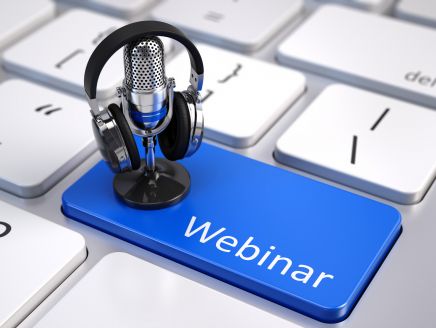
EFPA Webinars
At EFPA, we are committed to playing our part in ensuring the innovations and expertise of psychologists from our 38 member countries is shared among all psychologists in Europe during this coronavirus crisis, in order to benefit the citizens of Europe. Between April and June 2020, EFPA has organized a set of free webinars dedicated to COVID-19 psychology related issues:
- How to set-up a Psychological counselling helpline?
- Online consultations, what to know and where to start?
- COVID-19 and implications for mental health.
- Psychology Education & Psychology of Education in Post COVID-19 times
- Psychological knowledge to keep the virus under control: human factors
- Community renewal following COVID-19
The video recordings can be found here

EFPA Surveys
1. EFPA Survey on online/distance teaching of psychology
Abstract
The COVID-19 pandemic has affected many areas of our lives, including education. At the time of designing this study, most schools, colleges and universities across Europe were closed following government instructions in an effort to contain the pandemic. Psychology educators were required to modify their teaching methods, transitioning rather quickly from conventional to online delivery. The EFPA Board of Educational Affairs conducted a survey study to investigate how psychology educators coped with this situation, which technology and methods they used to teach psychology online, and which barriers and outcomes they experienced in this situation. Data collection is ongoing. Around 700 secondary school and university psychology educators from 25 European countries responded to the survey so far. Preliminary results show that participants across Europe faced similar challenges in adopting and adapting to online teaching methods, which were mostly technical and organizational in nature rather than pedagogical. Despite the fact that they found challenging to teach specific content of psychology courses online, they also described positive aspects of online teaching, reported examples of goodpractice and lessons learned that could be implemented into conventional teaching of psychology.
E-Health Special Issue:
Telepsychotherapy in the Age of COVID-19
Guest Editor: Jennifer L. Callahan
Recommendations for Policy and Practice of Telepsychotherapy and E-Mental Health in Europe and Beyond
Tom Van Daele*, Maria Karekla*, Angelos P. Kassianos*, Angelo Compare*, Lise Haddouk*, João Salgado*, David D. Ebert*, Glauco Trebbi*, Sylvie Bernaerts, Eva Van Assche, Nele A. J. De Witte (Members EFPA PG e-Health)
*Members of EFPA Project Group on e-Health
Abstract
The COVID-19 pandemic has brought with it a great need for the use of telepsychotherapy and other interventions using psychological theories and techniques to support both mental and physical health. E-mental health presents a wide range of opportunities in mental health care to overcome barriers for receiving conventional psychological care, especially when psychotherapists and clients find themselves in (self)quarantine resulting from a pandemic. For many psychotherapists and clients, the current situation provides a first experience with e-mental health and reliance on telepsychotherapy or other means of technology to provide or receive care, respectively. Psychotherapeutic circumstances may often be suboptimal, with psychotherapists and clients experiencing difficulties finding a private space or sufficient time for an undisturbed consultation.
This article aims to highlight recommendations on how to create the best possible context in which e-mental health supplements and enhances current services for clients. These recommendations are grouped according to 3 categories of key stakeholders: psychotherapists, health services and regulatory agencies, and developers. This article focuses on (a) how to make optimal use of technology in psychotherapeutic practice; (b) how to integrate e-mental health into the health care system to allow for a safe, transparent, and effective environment for (self) care; and (c) how to develop e-mental health applications.
Image below: a structured overview of all 25 recommendations
_w1616_h1002_1.png)
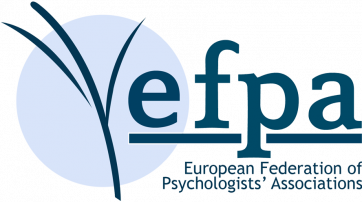
Covid-19
Working Differently Workstream
By: Noreen Tehrani, British Psychological Society representative to the Crisis, Disaster and Trauma Psychology Standing Committee, EFPA
The British Psychological Society (BPS) guided by its President David Murphy have set up eight workstreams to meet the challenge of the C-19 pandemic. These workstreams, overseen by a coordinating group have developed practical guidance for professionals and the public. [1] The guidance has been very well received and is used by the BPS in briefings to governmental bodies. The Working Differently workstream led by Janet Fraser, Chair Elect of the Occupational Psychology Division brings together representatives from a number of psychological specialties including occupational, clinical, counselling, educational and trauma psychology.
One of the pieces of guidance developed “Taking trauma related work home: Advice for reducing the likelihood of secondary trauma [2]” recognizes that the Covid-19 pandemic has resulted in many professionals handling distressing and traumatic material while working from home.
Exposure to distressing material, including traumatising conversations, images and written or auditory testimony, has been shown to occur in the day to day work of many professionals.
During lockdown measures, professionals have had to take these difficult materials and subject matters home, which can increase the risk of secondary trauma and compassion fatigue. With the support of understanding workplace colleagues being less available and the boundary between work and home life eroded, dealing with trauma-related work at home can affect wellbeing.
The guidance offers psychological advice to reduce the risk of trauma in a range of professions including: accident investigators, coroners, crime analysts, health and social care workers, insurance claims case handlers, offender managers, psychologists, safeguarding officers, social media moderators, social workers, solicitors and teachers.
In presenting this guidance Janet Fraser, lead for the Working Different Workstream of the British Psychological Association, explained:
“Most people see their home as a place of refuge, comfort and relaxation”, she continued. “If homes are used to deal with abuse, violence and trauma, this personal space becomes associated with the trauma. Not only that, but consideration must also be given to those also living in the home to ensure they are not exposed. I hope this guidance will give organisations, managers and supervisors the tools they need to continue to support and safeguard their team members through this difficult time.”
[1] www.bps.org.uk/coronavirus-resources
[2] 'Taking trauma related work home: Advice for reducing the likelihood of secondary trauma'
-
EFPA STATEMENT - Board Human Rights and Psychology
No justice - no peace:
Racism violates fundamental rights and basic psychological needs
June 15, 2020
On May 25th, 2020, the world witnessed the murder of George Floyd. George Floyd, an African-American, was killed in Minneapolis, Minnesota, USA, by a police officer, observed by three further policemen. The video of Floyd's death went around the world. It demonstrates the brutal expression of structural racism embedded in US-American society as well as the individual prejudice of the perpetrator.
Click on text to fold out
Click again to fold in again
Racism is embedded in our societies
Racism is a structural element not only of the United States of America, but also of many Western societies, if not of all societies in the world. Racism is embedded within the structures, institutions and organizations of our societies. The consequences of racism are seen in the devaluation, discrimination and violence against minorities. Racism is based on power differences between groups. It produces patterns of conduct and shapes social interaction in a way that enforces and stabilizes hierarchies, which ensure the white majority holds a dominant position over ethnic minorities, immigrants, foreigners and other minority groups.
Racism is inside our heads
Racism is not only an attribute of societies - it is also inside our heads. Human beings are well equipped to categorize the world into us and them. We often use such categorizations to position the ingroup above the outgroup. Outgroup devaluation can help to improve the status of our ingroup and thereby of our identity. Societies' structural racism fits excellently with these psychological mechanisms: The prejudice of individuals and their tendencies to discriminate against outgroups even to the point of violent action against such groups are supported by societal racist structures. And racist societal structures are reinforced and continue to exist if members of that society see the world through racist eyes.
Structural and individual racism are not confined to the United States of America. They can be found in racist ideologies and individual prejudice across Europe. Vivid examples are the hate-crimes against ethnic minorities registered all over Europe. Less visible but nevertheless highly invasive forms of racism are the incarceration of freshly arrived immigrants to Europe in overcrowded "reception centres" despite the dangers of the deadly infection that goes with COVID-19. One might also cite the brutal exclusion of refugees at the southern European borders.Racism endangers basic psychological needs
As evidenced in the murder of George Floyd and many hate crimes before, racism in its extreme form violates the right to live. In a more subtle way, racism also endangers basic psychological needs. The psychological consequences are dramatic, ranging from chronic feelings of threat and clinical syndromes such depression, to low levels of self-esteem and self-confidence and a reduced capacity to give structure to one’s life. There are significant consequences too for society as a whole: Racism reduces the trust and commitment to society whilst breeding insecurity and violence - as can be observed these days in the USA.
The toll of racism for its victims and society in general is extreme. Racism destroys individual lives and cultures. We call upon everyone who seeks to be a responsible citizen to refrain from using categorisations to devalue those who ‘are not one of us’. We invite everyone to look to a new vision and recognize all people as human beings of equal worth and rights. And we offer our skills and knowledges as professional psychologists to support our societies, its members and its leaders, in an onward journey away from racism.
This information has been prepared by EFPA’s Board of Human Rights and Psychology, convenor Prof. Dr. Ulrich Wagner.
The European Federation of Psychologists’ Associations (EFPA) represents psychologists’ associations across 38 European countries and some 350,000 psychologists. EFPA brings together Europe’s experts in Human Rights in its Board Human Rights and Psychology.
Contact:
EFPA Headoffice - Board Human Rights and PsychologyUli Wagner at headoffice@efpa.eu
_w646_h378_1.jpg)
The voice of psychology must be heard in the fight against racism and discrimination
Norway, June 24, 2020
By: Heidi Wittrup Djup, Standing Committee on Crisis, Disaster and Trauma Psychology, European Federation of Psychologists’ Associations (EFPA).
Recently, the world has witnessed massive demonstrations against fundamental racial inequality and discrimination, systemic racism, and violence and murders at the hands of racists.
-
Videos of killings and brutality against people of colour, as well as stories of victimization and suppression, have been thoroughly documented in the press and social medias worldwide. This has sparked a collective effort to stand up against such unjust and harmful treatment of human beings. As psychologists, we need to take part in this effort and bring our knowledge about the individual and societal consequences of racism to the front.
Click on text to fold out
Click again to fold in again
Racism has a number of psychological consequences, including mental health disorders such as anxiety, depression and post-traumatic stress, impaired quality of life, and poorer general health. As clinical psychologists, we meet people in therapy who have suffered from both explicit and more subtle expressions of racism. Some have experienced violence and threats against themselves or people close to them. Others have experienced continuous exclusion and a sense of not belonging, leaving them with disbelief that they will ever truly take part in a society which can provide them with safety, equal possibilities and positive prospects in life.
We meet parents who worry that their children will experience the same brutality and harassment that has been brought upon them in their own lifetime. Parents who do not know how to explain to their children why such inequality exists, or how to prepare them for what may come. We meet children who feel left out, judged and bullied based on the colour of their skin, who see the pain of their parents, and grow up with an expectation that they will never be fully accepted as equal members of society. Developmental psychologists know how aversive childhood experiences jeopardize the core of a child’s growth.
We meet people who are consistently treated differently from members of the majority, who struggle to be evaluated for jobs they are qualified for, who are expected to accept ethnic profiling by police and other officials. We see how racism intervenes with people's inner emotional lives, cognitions and experience of who they are, and how some adjust to a racial hierarchy and adapt to negative stereotypes, often referred to as “internalized racism”.
Often, the anger, fear, hopelessness and sense of worthlessness burden our clients. The profound shame might serve as an obstacle against telling even the therapist about the many humiliating and abusive experiences they have encountered. Due to public denial that racism even exists, they worry if the therapist will be able to understand and believe them, or if the invalidation they have experienced by their surroundings will continue in the therapeutic space.
As psychologists, we possess a broad range of competences within the field of research and applied psychology. Psychological researchers are vital to contribute to better understanding and significant changes in society. They are obliged to adhere to a high level of academic integrity and oppose abuse of scientific results. The knowledge from cognitive and social psychology can inform us about different aspects ranging from perception and decision-making, to group behaviour, attitudes and prejudice. All branches of psychology, including social, clinical, cognitive, developmental, political, cultural, and health psychology can produce and apply knowledge and interventions that improve understanding and create an array of changes. The sum of our knowledge is vast, and should be used wisely and actively to improve people’s lives and the world we live in.
Thus, psychologists have a responsibility to not only meet clients with a knowledge-based and validating approach, but to speak out against racism and societal structures that contribute to oppress minorities and members of specific groups. By using psychological knowledge, we can predict and understand the harmful mental and psychosocial effects and offer help and support to those who have been victimized. We can understand the underlying processes of discrimination and contribute to change the conditions where such occur. Furthermore, we are positioned to produce and deliver psychological knowledge that can promote basic rights at an individual and systemic level, and to reduce Human Rights violations.
The Universal Declaration of Human Rights proclaims that all human beings are born free and equal in dignity and rights and that everyone is entitled to all the rights and freedoms set out therein, without distinction of any kind, in particular as to race, colour or national origin. The International Convention on the Elimination of All Forms of Racial Discrimination (CERD) states that no one shall be victims of racial discrimination.
Racism violates basic human rights — even the most fundamental of them all: the right to live. Racism kills whenever it wants and suppresses wherever it is. It harms our societies, cultures, and populations — and leaves people in sorrow and pain.
The worldwide protests against racism and discrimination, give us all an opportunity to listen, speak out, and stand together as the fight against such human rights violations continue. As psychologists, we need to grasp this opportunity. Therefore, we would like to urge the national psychology associations all over Europe to make a clear statement against racism, to ensure that psychologists acquire the knowledge necessary to prevent and treat negative health outcomes of racism, to encourage professional contributions at a societal level, and to support us all as we find our voice to speak out against racist behaviour, structures, and politics. No one shall stand alone as the fight continues.
Heidi Wittrup Djup.
_w472_h626_1.png)
Special Issue of The European Psychologist
“Understanding, predicting and preventing violence”
- Strategies for assessing and preventing inpatient violence in forensic hospitals: A call for specificity. Dexter, E., & Vitacco, M. J. (2020). European Psychologist, 25, XX-YY.
- Attitudes toward intimate partner violence against women in the European Union: A systematic review. Gracia, E., Lila, M., & Santirso, F. A. (2020). European Psychologist, 25, XX-YY.
- Groat, L.L., & Shane, M.S. (2020). A motivational framework for psychopathy: Towards a reconceptualization of the disorder. European Psychologist, 25, XX-YY.
- Intimate partner violence perpetration and psychopathy: A comprehensive review. Robertson, E., Walker, T. M., & Frick, P. J. (2020). European Psychologist, 25, XX-YY.
- Unique risk factors of the co-occurrence between child maltreatment and intimate partner violence perpetration. Sijtsema, J. J., Stolz, E. A., & Bogaerts, S. (2020). European Psychologist, 25, XX-YY.
- The association between emotion, social information processing, and aggressive behavior: A systematic review. Smeijers, D., Benbouriche, M., & Garofalo, C. (2020). European Psychologist, 25, XX-YY.
-
